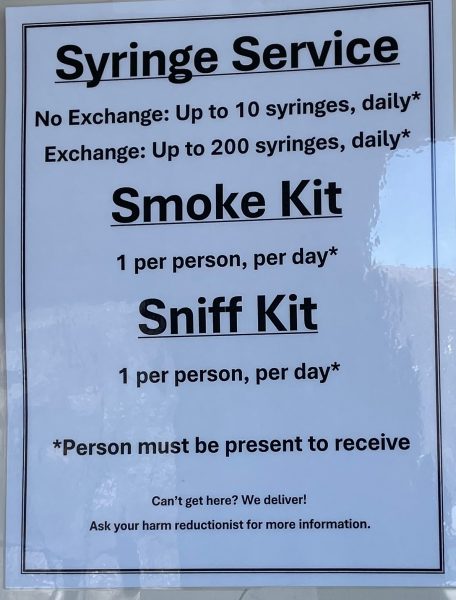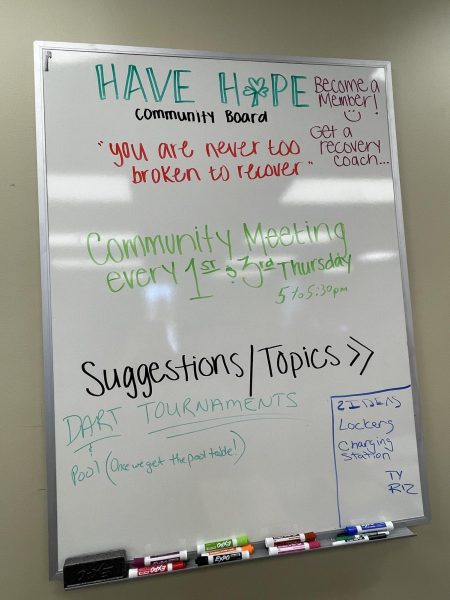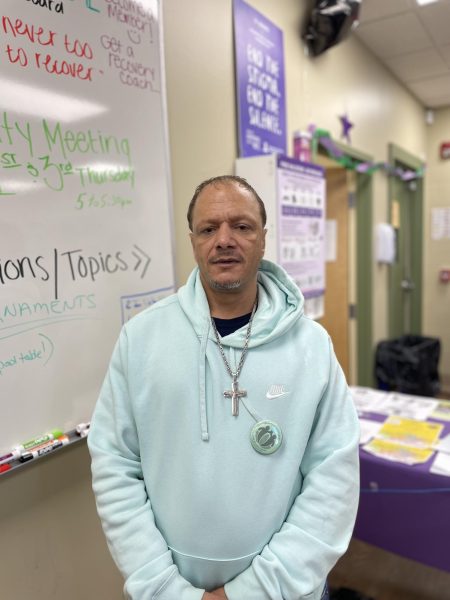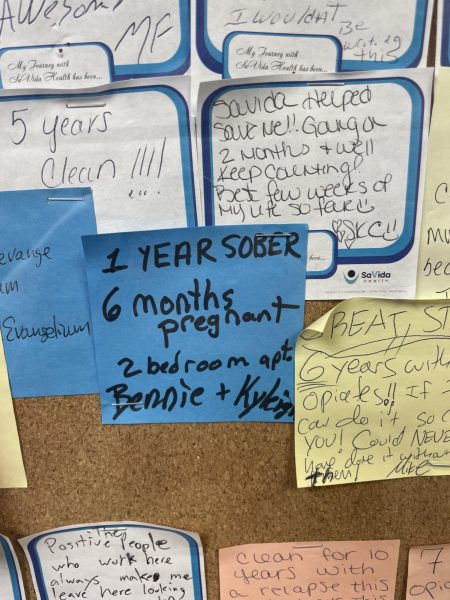Note: Out of respect for their privacy, this story includes only the names of individuals who have given their explicit consent for disclosure.
Fentanyl, Xylazine, cocaine, methamphetamine, and other illegal narcotics run rampant in the Berkshires, especially in North Adams where substance abuse is one of the city’s biggest issues. Amid the challenges, however, there are stories of hope and resilience, fueled by the unwavering commitment of individuals and organizations dedicated to providing support.
“When I finally did ask for help for the first time, I had no idea I could just walk into a detox, and here’s Mass Health, and here’s a bed; medication,” said Mark, a 32-year-old recovering from cocaine addiction and an ALC client. He’s not alone: North Adams has options, resources, and a community ready to help those struggling, but they’re often overlooked.
Paul Supranowicz is the owner and founder of Alternate Living Centers (ALC), one such organization serving Berkshire County. He works with the aim that individuals can overcome addiction, rediscover their purpose, secure employment, and reunite with their families. Through harm reduction strategies and collaborative efforts, community leaders are making strides in transforming lives and fostering a brighter future for those affected by substance abuse.
“In six months or so [after], they can buy an apartment and become productive members of society,” Supranowicz said of ALC’s clientele.
Mark and Marissa
Mark, previously mentioned, and Marissa, a 29-year-old who will soon graduate from the ALC program, shared their experiences in an interview with The Beacon.
Mark, who grew up in Springfield, found himself in North Adams and is seeking a new direction after a relapse in January.
“A lot of times when you come from a relapse or go from active use, you don’t know what the hell you need,” he said.
He spoke highly of the supportive community at ALC, where he enjoys being around people from all walks of life, helping each other through their struggles. Mark is currently living in ALC’s structured housing program and is making strides everyday.
Marissa has faced her own tumultuous journey through addiction and incarceration. After getting out of jail in November of 2024, she has been using ALC’s services ever since.
“As someone who is diagnosed with bipolar disorder, in the anger management and brain injury [support groups] I have learned a lot,” she said. Marissa also visits Drury High School to talk to students about her recovery journey and is up for graduation from the ALC outpatient program.
The ALC Outpatient Services, under the leadership of Clinical Director Kate Frissell, provides a structured environment for individuals seeking recovery from substance abuse. Frissell has a background in education and has been around substance abuse throughout her life. She has been instrumental in the program’s evolution since its inception as a sober house for men in 2012-2013.
The program includes individual counseling, group therapy, life skills training, and specialized services for brain injury and anger management. The residential staff, comprised mostly of individuals in sustained recovery, supports clients in transitioning to less structured housing while maintaining community engagement requirements.
“Our mission is to bring as many services as we possibly can under one roof,” Frissell explained.
Berkshire Harm Reduction, North Adams Police, and Emergency Response Services
Berkshire Harm Reduction (BHR) is another organization working to connect addicts with resources. At its forefront are Sarah Dejesus and Krystle Kincaid. The walls of the BHR building are covered with posters promoting safe practices and information regarding health crises. Inside each day, Dejesus and her team prepare to welcome individuals from all walks of life, each with unique stories and struggles.
BHR’s efforts are abetted by the work of local emergency services, like Northern Berkshire EMS, who play a crucial role in responding to substance-related emergencies.
“North Adams has a higher volume of substance abuse calls out of all 13 areas that they cover,” Deputy Chief Adam O’Neill noted in an interview with The Beacon. “A lot of dealing with wound care, [it’s] not just overdoses that impact the call volume.”
The Northern Berkshire EMS teams are often the first point of contact for individuals in more critical situations when they cannot make it to harm reduction services in time. They work closely with the harm reduction team to ensure a continuum of care.
“The goal is to keep people safe and to keep people alive while they are using substances,” Dejesus explained.
Community leaders, including North Adams Police Chief Mark Bailey, are advocating for harm reduction, despite ongoing national debates regarding its effectiveness.
“It’s there, the community wants it, it’s stopping the spread of diseases, and it’s helping the person through the hardship so they can get back on their feet,” Police Chief Bailey told The Beacon.
Dejesus and her team, spread across the Northern Berkshires, primarily work with individuals in active addiction, providing essential services that prioritize health and safety. The needle exchange program is one of their major initiatives, offering clean needles and other supplies, such as alcohol pads and tourniquets, to prevent infections and promote safer injection practices. Additionally, BHR offers drug-checking services, which allow individuals to bring in samples of substances for on-the-spot testing to ensure they know exactly what they’re using.

“Trust is a big issue for people,” Kincaid explained. “We try to make our services as low barrier and accessible as possible, so we don’t take identifying information from people.” This anonymous approach fosters a safe space for individuals to seek assistance, without the fear of stigma or repercussions.
“If someone is trying to move forward and better their life, they shouldn’t be held back by past convictions,” said Curtis, one such individual with a history of substance abuse. “Those were mistakes they made in the past; how are they going to change in the future if no one will give them a chance?”
“It’s about harm reduction, not judgment,” Dejesus emphasized. “We want people to feel like they can come here and be themselves.”
Community Resources and Outreach Programs
The Northern Berkshire Community Coalition (NBCC), led by Executive Director Amber Besaw, is another vital player in the fight against substance abuse. With a mission of “creating communities where people can be happy, healthy, and thrive,” the coalition partners with approximately 150 organizations in Berkshire County.
“There is a perception that the coalition is here for people in need, and so if you’re not in need then you aren’t looking for us, but that is not entirely true,” Besaw explained. Her vision for the coalition is one of inclusivity and support.
“We want to be the bridge,” she stated, emphasizing the importance of connecting individuals with the resources they need. The coalition works in many sectors, including family support, youth development, and substance use prevention work, aiming to create a holistic approach to community health.

Besaw aims to continue expanding the coalition, which hosts forums and events to raise awareness about substance abuse. “We would love to see more people involved – who want to engage with us and say how can I help?”
Also working with NBCC, through the direction of the Brien Center, is the Have Hope Peer Recovery Center (HHPRC), led by Program Director Rebecca Dodge.
“Everyone here has addiction-related things in their background,” Dodge said, explaining the peer-to-peer support model as “walking the person through their recovery.”
The center offers a safe space for individuals to connect, share their experiences, and find hope. Rebecca’s team organizes various activities, from NA/AA meetings to movie nights and life skills workshops, “We’re bringing the fun back to recovery.”
Walking into the Have Hope Center, the efficacy of their approach is visible—and audible; patrons were eager to share their stories of addiction and recovery.
Curtis

Curtis, a 56-year-old man, has battled addiction since he was 19 and spent over 280 months in prison throughout his lifetime for drug-related offenses. After moving from New Bedford for a fresh start, he found hope and support in North Adams.
Curtis initially held a bleak outlook on life, having faced immense personal tragedy, including the murder of his father at age 13 and losing his sister to Hepatitis C at 36.
“I used to have an attitude that no one wanted to help me, that there was nothing out there for me,” he said, in an interview with The Beacon.
Through the resources provided by the North Adams ALC and the HHPRC, he has made significant strides, including achieving a year of sobriety. The center also helped him secure an apartment—his first ever with his name on the lease.
“I accomplished things in under a year that I wasn’t able to in a lifetime,” Curtis reflected, eyes shining with pride. “Here, the members have a voice.”
Gena
Another HHPRC patron, Gena C., 57, has dedicated the last 25 years to her recovery journey, a path shaped by profound loss and resilience.
“My drinking was to soothe my loneliness,” she shared with The Beacon. Gena’s husband was tragically killed in a car accident, leaving her alone with their three-week-old son, and she later lost two sisters as well. “My goal is to help the next person along; you don’t have to suffer, there is an answer.”
Now, Gena is a recovery coach at HHPRC and lives at Keenan House, a residential program in town. On May 5th, she will be two years sober, as well as off all controlled medications for seven months.
Gena say she now recognizes that her struggles with substance use were a generational cycle where self-medication was common, especially among family members who relied on drugs to cope. She is active in local NA and AA meetings, especially with a Christian recovery group that meets on Friday nights, and values the connections she makes with others, learning how they navigate their sobriety. Finding a church where she feels her heart is full again, even on tough days, has been a vital part of her recovery, too.
Looking ahead, she hopes to take the ACE substance abuse counselor course this fall, committed to giving back to the community that has supported her throughout her journey.
Moving Forward
Despite ongoing efforts, there’s a pressing need for more resources to aid individuals in recovery. The question is, what can help them help people?
For Dejesus and Kincaid the answer is clear: more staffing and mobile vehicles for outreach. Recently, they introduced mobile units, likening them to “DoorDash for harm reduction.” These units are equipped with essential supplies and information, allowing staff to meet individuals where they are—whether in parks, at community events, or even in the comfort of their own homes. “This flexibility is crucial in a rural area like North Adams, where transportation can be a barrier to accessing services,” Kincaid explained.
Dejesus also envisions safe consumption sites: places “to be able to watch people use substances – make sure they’re being safe, [to] make sure they don’t overdose, to make sure they don’t die.”
North Adams PD and Northern Berkshire EMS are calling for more collaboration. Chief Bailey disclosed that in their new Critical Incident Management System, there is now an outreach from social workers, to combat the “disconnect that used to happen when the user got released from the hospital.” Deputy Chief O’ Niell also emphasized the importance of community involvement. “We have to all work together, because substance abuse needs a collaborative approach.”
Rebecca Dodge is grateful for what HHPRC has accomplished in only a year, but admits more staff and a bigger space would enable more organized programming, training, and ultimately more happy, healthy people. Gena wishes more people in the community knew about the center, so they too can benefit from their services.
Mark hopes to see more psychiatric services offered within ALC, while Marissa highlighted the need for a female residential facility, as many women leave jail only to return shortly after, due to a lack of tailored support and resources. She is also a passionate advocate for preventing youth substance use.
“There needs to be more contact with these kids. Stop it when they’re young,” Marissa said, calling for more safe, engaging spaces for children. “The drugs will always be a problem; my biggest thing is that [there] is nothing to do here for kids…nothing for them to just go and do that’s safe and fun.”
Kate Frissell echoes Marissa, believing that breaking the stigma of addiction requires education at the school level, equipping children with the information they need to make informed choices.
“The lack of information is what is killing our kids,” she asserted, advocating for age-appropriate education to prevent future tragedies. “We are so well beyond the point where we can hide this, where we can act like it’s not going on; not in my house, not in my backyard, but it IS in your house and your backyard.”
In North Adams, the battle against substance abuse is a united endeavor, driven by the unwavering commitment of individuals and organizations, dedicated to creating positive change. From harm reduction initiatives to community coalitions, the resources available reflect the strength and resilience of the community. Marissa, Curtis, Gena, and Mark are living proof that recovery is attainable, and with the right support, individuals can reclaim their lives and play an active role in fostering a healthier, more connected community.
Together, they are building bridges that connect those in need with vital resources and support, working towards a future where everyone has the opportunity to thrive.
The road is long and hard, but the community is determined.
“There’s a lot of obstacles, but it’s knocking one down at a time,” said Curtis.

Resource Guide (North Adams Locations)
Brien Center: (413) 664-4541
ALC Outpatient Services: (413) 499-6300
Berkshire Harm Reduction: (413) 398-9937
Have Hope Peer Recover Center: (413) 398-1371
SaVida Health Clinic: (413) 398-5180
Clean Slate Clinic: (413) 346-2544
Northern Berkshire EMS: 911, Non-Emergency (413) 664-4933